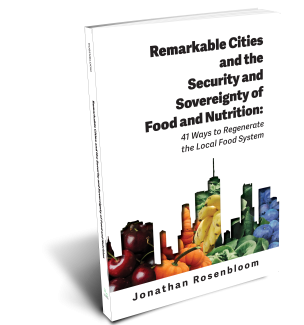Development impacts many aspects of the food system, including where food is grown, how far food must travel before it is consumed, where distributors and retailers of food are placed, and who has access to fresh and nutritious food. But if development fails to create and support food secure, self-supporting neighborhoods, it is not sustainable. By looking at development and its associated impacts through a sustainability and lifecycle lens, we can rethink the role of development and how communities can grow while fostering a strong, inclusive, affordable, accessible, and healthy food system. Instead of being a force that exacerbates inequalities in access to nutritious food, increases greenhouse gas emissions, and damages wildlife habitats, development can be reconceptualized as a positive force to help regenerate and expand a local sustainable food system.

In Remarkable Cities and the Security and Sovereignty of Food and Nutrition (ELI Press 2023), Prof. Jonathan Rosenbloom seeks to jumpstart a move toward healthier, more equitable, and more environmentally friendly communities. He does so by focusing on the way local governments regulate development and how that impacts the food system. While the food system is heavily affected by many international, national, and state policies, local laws regulating development have a significant impact on the food system. And yet, they remain some of the least explored laws. This book looks to begin that exploration by making 41 recommendations to amend development codes to increase food and nutrition security and sovereignty and create healthier communities.
The book stems from the Sustainable Development Code, which aims to help all local governments, regardless of size and budget, build more resilient, environmentally conscious, economically secure, and socially equitable communities. The book is organized by recommendations that remove barriers, create incentives, and fill regulatory gaps. For example, when zoning regulations allow gardening by-right on residential properties, homeowners face fewer barriers to producing their own food and may have greater access to healthy and fresh food. Similarly, incentivizing grocery stores to open in food deserts can improve food security and promote food sovereignty. And in instances where big box retailers and dollar stores are driving out vendors that might otherwise provide residents access to healthy nutrition, communities can pass ordinances to restrict them.
The book also includes examples of local governments that have adopted the recommendation to see how they work in real life. The introduction to the book is featured in the Summer Reading issue of the Environmental Forum, and a few of the recommendations and examples from that book are excerpted in the June issue of ELR—The Environmental Law Reporter. And ELI’s Sarah Backer sat down and spoke to Professor Rosenbloom about his book in a recent podcast.
Not every recommendation will apply to every jurisdiction. And the decision to adopt a recommendation should be a community, bottom-up one. But as public awareness grows about the problems facing us, this book will help communities find new and creative ways to solve challenges around the food system.
